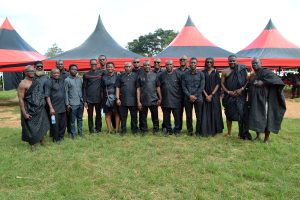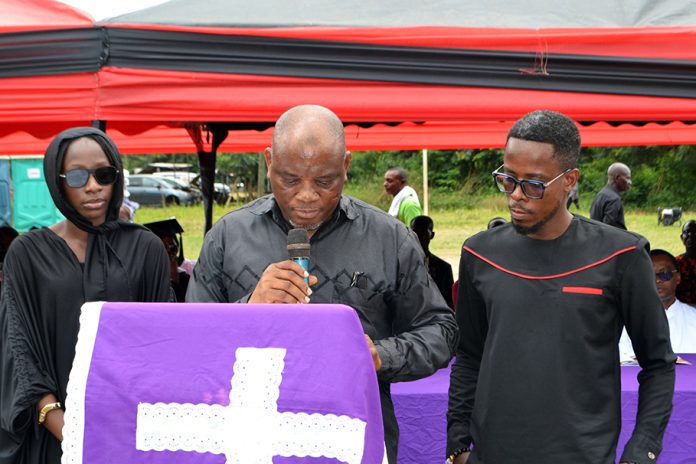Today, as we gather around the remains of our beloved General Manager and friend, Mr. Kobina Ebo Quansah, affectionately called Uncle Ebo, we are filled with a mixture of grief, pride and gratitude.
Grief, because we have lost a man whose presence shaped not only our newsroom, but Ghanaian journalism as a whole. Pride, because we had the honour of working with him, learning from him and being part of his story.
When Mr. Ebo Quansah joined The Chronicle in 1997 as Editor, many of us did not fully appreciate the depth of his courage or the journey he had already travelled. It was only later, through his stories and mentorship that we came to understand that he was not just a journalist, he was a warrior with a pen.

Long before his time at The Chronicle, he had built a reputation for standing up to military rulers with nothing but words. He often shared how under the regimes of Col. I.K. Acheampong, F.W. Akuffo and later Jerry John Rawlings, he refused to be silenced. His pen became his shield and truth became his guiding star. Even when his editor at the Ghanaian Times scolded him for daring to criticise Rawlings, he never wavered. For him, journalism was not about comfort, it was about conscience.
When the Provisional National Defence Council (PNDC) plotted his arrest, he narrowly escaped. With only fifty pence in his pocket, he landed in London, uncertain of where he would sleep that night. Yet even in exile, his voice never dimmed. From abroad, he continued writing, holding the regime accountable from afar. That was who he was: a man whose pen could not be broken by fear or distance.
It was his close friend, Nana Kofi Coomson, the publisher of The Chronicle, who convinced him to return to Ghana and help strengthen The Chronicle. When he joined, the paper was just a weekly publication. With his vision and determination, he expanded its reach, introducing the Thursday edition, with a strong focus on sports, his great love.
But more than that, he gave the paper a voice. His famous by-line, “Ebo Quansah in Accra” became a signature of fearless journalism. His satirical column, Asebu Amenfi, was both entertaining and biting, exposing corruption and ridiculing dishonesty in high places. Many public officials dreaded seeing their names in his column, but ordinary Ghanaians loved him for it. He made journalism not only about reporting, but about impact.
When he later left to work with the New Times Corporation, editing the Evening News and later consulting for the Ghanaian Times, The Chronicle felt his absence deeply. So when he left the New Times Corporation, Nana Coomson once again approached him, and he returned once more and it felt like the paper had regained its heartbeat again. In 2014, he was promoted to the position of General Manager, but even then, he never abandoned his pen. Nearly every day, he wrote, debated and guided the newsroom with the same passion he had shown decades earlier.
For us at The Chronicle, Uncle Ebo was more than a boss—he was a teacher. He had a gift for turning stories into powerful headlines in a matter of seconds. Many of us would bring him rough drafts, only to watch in awe as he shaped them into masterpieces. He was a walking encyclopaedia, drawing on decades of experience, historical knowledge, and political memory.
But what we remember most was not just his brilliance—it was his generosity. He shared his knowledge freely, corrected with patience, and always found time to explain. He could be stern, yes—especially when deadlines were missed or facts not checked properly—but his goal was always to mould us into better journalists.
Though he sympathised openly with the Danquah-Busia (UP) tradition, Uncle Ebo was first and foremost a professional. He did not allow politics to cloud his judgement. He could be as critical of the NPP as he was of the NDC, and he stood firm in his belief that journalism’s loyalty must always be to the truth.
We recall how, on one occasion, he published a strongly worded piece against an NPP government official. When cautioned to tone it down, he replied firmly: “I am not a robot—I am a professional journalist. The fact that I sympathise with the NPP does not mean I should not criticise them.”
On another occasion, he criticised the then opposition leader, John Dramani Mahama, his personal friend and when the Editor raised concerns, he laughed and said: “The fact that I criticise Mahama does not mean I hate him. Friendship is friendship, but truth is truth.”These moments taught us that true journalism demands courage to speak truth to power no matter whose power it is.
Beyond his work, Uncle Ebo was full of character. When writing his column, he allowed no distractions. The moment his pen touched paper, he shut out the world until the last word was done. Yet once the work was over, he could be humorous, witty, and deeply engaging. He enjoyed discussions that stretched late into the evening, often sprinkling in stories from his career that left us both laughing and thinking.
He was firm, but never arrogant. Principled, but never unkind. Even when disagreements arose in the newsroom, he later reflected quietly and, when necessary, would call to say: “I’ve thought about our discussion—I think you’re right. Let’s make the change.” That humility, from a man of his stature, was perhaps one of his greatest strengths.
Today, as we remember him, we realise how much of The Chronicle carries his fingerprints. From the structure of our editions to the spirit of fearless writing, his influence runs deep. He taught us that journalism is not about applause, but about accountability. Not about comfort, but about conscience.
To the younger generation, he leaves behind an example of integrity and resilience. To his colleagues, he leaves memories of mentorship, debates, and laughter. To Ghana, he leaves a legacy of fearless journalism that stood the test of dictatorships, exile, and political pressures.
We at The Chronicle are proud to have walked this journey with him. We are proud to have called him not only our General Manager, but our mentor, our teacher, our colleague, and our friend. We will miss his encyclopaedic knowledge, his sharp pen, his laughter, and above all, his courage.
Yet we are comforted by the words of Scripture: everything that has a beginning must also have an end. Mr. Ebo Quansah’s earthly journey may have ended, but his impact will never fade. His writings will continue to inspire. His lessons will continue to guide. His memory will continue to live in our hearts.
Uncle Ebo, Dr. Asebu Amenfi, fare thee well. Your pen has rested, but your voice will echo across generations. Until we meet again, may your soul find everlasting peace in the bosom of the Lord.









